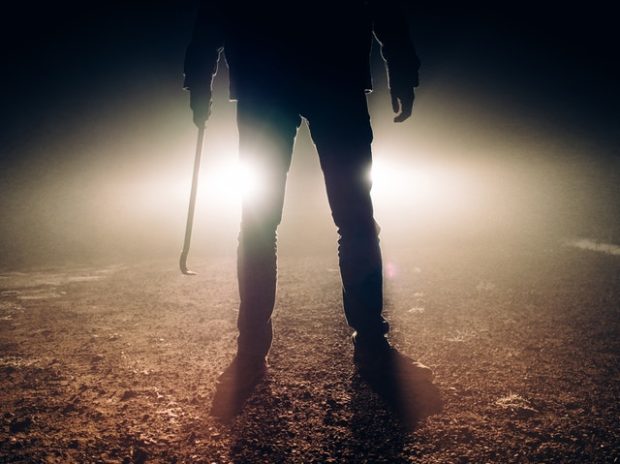You have no items in your cart. Want to get some nice things?
Go shopping
I
I can’t help thinking about him; and I am sure it was a him.
The force required to break down the old but strong back door of our house makes it difficult for me to imagine a female burglar – am I being sexist? – and it must have taken him at least twenty minutes. The door and the door frame had been battered to death.
Our first reaction was panic. Have they taken our laptops and hard discs where we keep our work? This fear was quickly allayed as we managed to locate all our computer hardware. Then something else crashed into my mind. What about passports, or bankbooks? Another wave of anxiety, only ebbing away after we’d ascertained that none of these had been stolen.
Yet in all this frantic activity (phoning the police, checking things, contacting the insurance company), neither my wife nor I broke down into howling anger. In fact, we somehow began to experience a sense of having been let off lightly. I suppose it was to do with the absence of any gratuitous vandalism perpetrated by the burglar (excrement, graffiti or broken glass). We almost felt grateful.
Yes, our back door was severely damaged, but whether that particular piece of vandalism was gratuitous is debatable. In order to get in, the burglar had to break down the door. If gaining entry was the premise, the damage done to the door was logically necessary – not gratuitous. Isn’t this argument reasonable?
One thing that intrigued me was the fact that the burglar hadn’t touched the washing standing by the back door. We don’t leave washing in the garden overnight, and the place where the drying rack stood was the best indoor spot for the purpose. But the rack hadn’t been knocked over. I thought to myself, this must mean he pushed open the door just wide enough to squeeze himself in; and instead of kicking the washing out of his way, he meandered round it to get to the corridor. Of course he might have moved the rack and then moved it back, but I couldn’t find any sign of disturbance in the clothes. I had to conclude that he came in and exited without touching the washing.
He has now forged a place in my mind. He has entered our intimate spaces, seen the jars and lotions in our bathroom, looked into our wardrobes, fingered our purses and wallets, maybe even read our personal letters. What were we doing when he tip-toed up the stairs in our house? At that time my wife and I were sitting down to dinner with a group of artists in a village hall many miles from our home, before enjoying the screening of an experimental film. If only we had decided not to go to that event.
Did he go straight to our bedroom or did he check the living room first? Did he switch on the lights in the house or stick to his torch? Did he take pictures of the layout of our house? Were we targeted? Or was it purely opportunistic? There are so many unanswerable questions. We had lived in another big city for twenty odd years without incident, and then this happened less than nine months after we’ve moved to this town. We like our new neighbourhood, but now the house feels jinxed.
People whose loved ones have died often say the world has lost its colours. Of course, it is facetiously melodramatic to compare my experience with the heartrending loss that widows and widowers go through. Nevertheless, there is a similarity here. I remember driving home after the artist film event with a mildly euphoric sense of possibilities and how they could be turned into reality in our work. The very first moment of realisation that our house had been burgled changed all that. The world suddenly lost its colours; its vibrancy gone.
The police came and took statements, and collected whatever evidence they could find. We were given an incident number, and they said we could phone if we needed further help. We’ve not heard from them since. Like so many other things, this “incident” will no doubt vanish without trace in the infinite universe of human happenings.
II
In the past few months, I often imagined a confrontation with the burglar: Stop! You’ve no right taking my stuff! And he would reply: I need them more than you do! As he was running away, he added, You’ve got more than you need…
Have we got more than we need? It depends on how “need” is defined. But I almost felt he might be right. He kept saying in my head, you’re the haves, I’m the have-not! Is this the true nature of the event? Or is it my middle-class guilty conscience playing tricks on my mind?
No, I cannot imagine this unwelcome incident as a Robin Hood act. But is it really totally unacceptable to say in the grand scheme of things what happened here might be some kind of redistribution of wealth that could in the long run make the world more a level playing field? What if he does need the money more than I do? That he has young children to feed and a seriously ill wife to look after. This is entirely imaginable. And what if it is, in the final analysis, this ultra-unequal capitalistic world that has driven him out of work and robbed him of the dignity of earning his keep legally?
On the other hand, I cannot rule out the possibility that he is an irresponsible drug addict, breaking into houses in order to feed his habits. Or maybe he is someone who just wants the buzz of taking other people’s stuff wherever he feels like it. Which portrait of the man would I prefer?
Yesterday I was waiting for my bus in town when a young boy came along and, while staring at the electronic display, said triumphantly to his grandmother, Number eleven, four minutes! He was about five, probably in his first year at school. He was clearly enjoying his ability to use words. Suddenly a thought came into my head, even Hitler was once a bouncy five-year-old! A sobering thought. How did an innocent little boy from the 1890s become a man without hope in 1945, who, after having perpetrated enormous atrocities, decided to kill himself and his newly-wedded wife in an airless underground bunker? What was my burglar like when he was five?
No doubt Fagin had the knack of training his young operators to perfection, and I do wonder whether my burglar has benefited from a similar kind of “education”. All things considered, perhaps this is to be preferred to the kind of training that produces child soldiers carrying Kalashnikovs; or worse still, the type of upbringing that brainwashes children into hating their enemies to such an extent that beheading is seen as a sacred duty.
When a small hired car or a kitchen knife could wreak havoc on a whole community’s peace of mind, the use of an ordinary screw-driver to force open the back door of a family home is nothing to be surprised about.
As I was pondering about all this, the radio suddenly grabbed my attention. A journalist was reporting from a hospital in a northern Israeli town near the Syrian border. The medical staff there were treating many Syrians who had crossed the border seeking help – both civilians and fighters from various factions; among them a lot of children. Their stories were heartrending. From the interviews, it was clear the medical staff were unwavering in their dedication to saving lives. This place was indeed a “kernel of goodness”, as the journalist said. This, our bewildering world! There are people who sacrifice others; and there are people who make sacrifice for others. Life is nothing if not confusing.
III
Even though our life has returned to normal, the burglar is still on my mind.
Does he think about how we felt when we discovered his handiwork? The fact that he seemed so careful about not making a mess in our house confuses me, such as shutting the drawers properly after checking them, or not pulling out all the books on the shelves to see if there was anything valuable hidden behind them. While he did leave our bedroom in a disorderly state, he hadn’t rummaged under the duvet or in our underwear drawers. A sign of his respect for our privacy?
I know it is foolish for me to think like this. He probably did not want to stay in the house for too long, and, after getting what he was looking for, did not bother to disturb the bed or the books. But if time was in short supply, why didn’t he simply empty all cupboards, throw things hither and thither, or kick out of his way anything he didn’t want? Is there something deep in his parsimonious style?
Many philosophers, biologists or psychologists believe that human languages constitute the defining characteristic of our species. There is one particular feature in human languages that seems unique – the evolution of the second person pronoun. It is in employing the pronoun “you” that a relationship can begin. Martin Buber has famously built a whole philosophy on the simple concept of “Ich und du” (I and Thou). As soon as we start to think about, or talk to, “you”, we cannot treat you as an object, as a product, or as a unit of profit.
My wife said the burglar would have an image of us in his head, as he must have looked at our photographs in our bedroom. But are we a “you” to him? What would happen if indeed I had the chance to use the second person pronoun to address him in real life?
Picking up the pieces is not only to do with organising the insurance claims, getting the broken door replaced, installing an alarm system, etc; it is, more importantly, to do with re-arranging my mental furniture and trying to restore a semblance of psychological equilibrium, which is harder to achieve.
There was a time, after the burglary, when my wife found it hard to cope with both of us being away from the house even during the day, let alone in the evening or overnight. When we did have to go out together, her anxiety became noticeable. It was then that I felt angry. My anger was not about the loss of money, but the loss of peace of mind. Our worry has little to do with guarding jewellery or cash; it is to do with the impossibility of carrying with us our Macbooks and external hard drives whenever we have to be away from our house.
Forced entry is an act of violence, no matter where the force is applied. It has always been a commonplace occurrence in the history of our species. Forced entry into a person’s body; forced entry into someone else’s online identity; forced entry into the mind of others; forced entry into a family home; forced entry into a company’s accounts; forced entry into the territories of another country; forced entry into the sovereignty of a nation… The violence might not be visible or blood-letting, but it will irreversibly change the life affected by it.
Somehow this tall, slim burglar (but where did I get this image from?) has forcibly entered my consciousness and reshaped the landscape of my inner life. Other than him being bespectacled and not bald (yes, I’m imagining), I do not know what he looks like. Yet I can’t help but feel I am in a relationship with him, one that, most likely, is entirely one-sided, not an “I-Thou” affair. But nonetheless significant. How all this would pan out is anybody’s guess.
The #Litroweekender’18 this bank holiday 26th – 27th May on the Bloomsbury fields of SOAS University. Get your tickets HERE.

About Chin Li
Chin Li, born and brought up in Hong Kong and now living in Scotland, has published poetry, short fiction and other work in Big Fiction Magazine, Confluence, Glasgow Review of Books, Gnommero, Gutter, Ink Sweat & Tears, Litro, MAP, Southword and Visual Verse, and has turned some writings into audio pieces, the most recent of which are three audio short stories broadcast by the Glasgow-based art radio station Radiophrenia in May 2019, November 2020 and February 2022 respectively. Chin Li worked as an NHS clinical psychologist for many years before turning to writing full-time in 2015.



